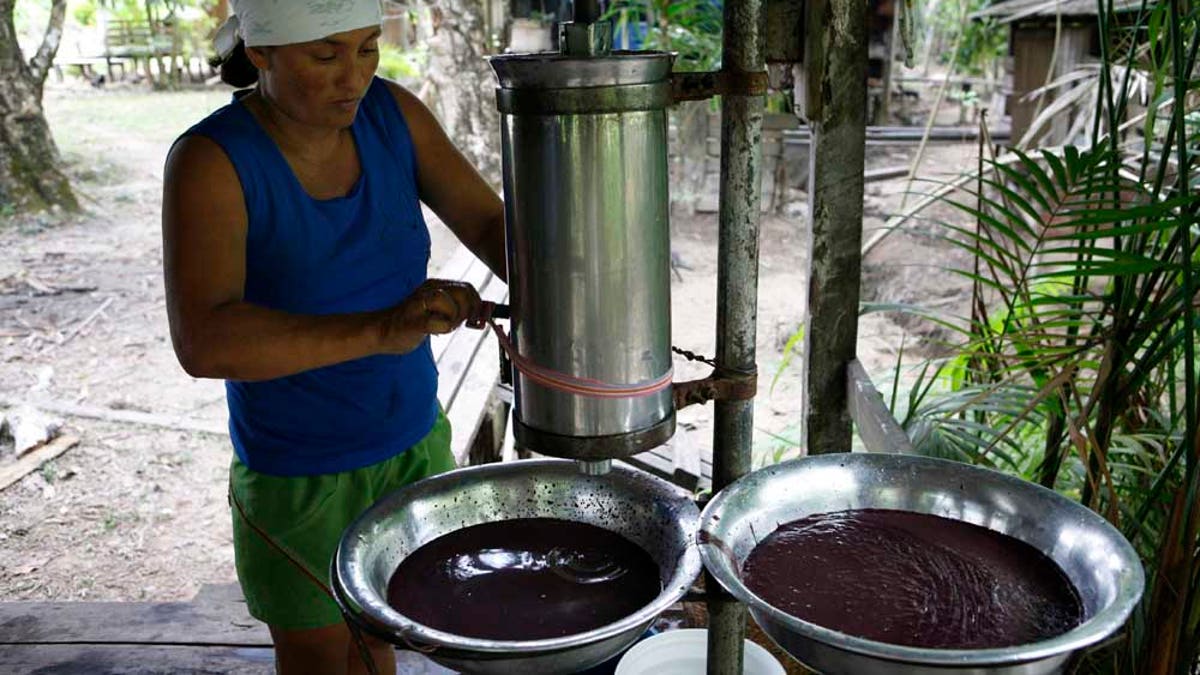
Oct 26, 2007 - Picanco River, Amazon, Brazil - The Ribeirinhos (river people) living on the Picanco River, Amozanian Estuary. LURDIEL DE SOUZA MAIA (age 33) makes Acai berry pulp. Intensive cattle and soya plant farming is decimating the Amazon rainforest, but there is hope. A marble-sized, purple berry is the staple ingredient of a popular smoothie (Newscom TagID: zumawirewestphotos553698) [Photo via Newscom]
The hype surrounding the Brazilian fruit acai (pronounced ahh-sigh-EE) is impressive. Between the exposure it’s received on “Oprah” and features on shows like “Good Morning America” and “The Today Show,” acai seemed poised to become a regular part of the American diet, at least among the growing number of health conscious citizens. Yet over a year later, the berry still remains below the radar of many people, including fitness enthusiasts.
“There’s no point in selling it if nobody is buying [acai],” says Victor Goh, the juice bar manager of The New York Health and Racquet Club. The club began stocking acai in 2005 but due to low sales, removed the item from the menu earlier this year. Since they stopped selling acai, only one patron has expressed disappointment. Apparently that was not enough to bring the item back. The best selling shakes, he tells me, are peanut butter banana and strawberry. Those shakes are also less expensive to make.
“Acai costs more than any of the other products that we put into our shakes,” Goh adds. Due to the fact that acai is harvested only in Brazil, the cost of freezing and importing it carries over to the coustomer.
Acai is not exactly flying of the shelves in the supermarket either. In fact, the majority of the supermarkets that I visited here in New York City had the same acai on the shelves that arrived last year soon after all the hype began. Bear in mind, as well, that I was not just checking out general supermarkets, but rather I specifically sought out stores that present themselves as cutting edge, healthy establishments – many of which specialize in organic food products.
Born and raised in Brazil, the home of acai, Fabio Clemente is a Brazilian Jui-Jitsu instructor at Studio X in Manhattan’s trendy East Village neighborhood. In addition to teaching American students the art of Brazilain Jiu-Jitsu, Fabio also sells the Brazilian fruit in question out of his studio. The healing powers of acai and the energy boost you get from the berries would seem to go hand in hand with the grueling workout that Clemente puts his students through.
Today, however, the only acai that I see in the studio is a large frozen bag of it that a student is using to ice his injured knee. The only beverages that I see being consumed by the students during the class are water and Gatorade. At the end of the class, however, the student who had been icing his knee decides he might as well drink the frozen juice because it is melting.
“It’s just a matter of time,” Clemente assures me. While he acknowledges that it seemed like it would have become more popular by now, he maintains that the benefits of the fruit cannot be denied. “It has lots of antioxidants,” Clemente reminds me. “Brazil is hot all year round, so of course people drink it more [there], but they have it at Whole Foods [in NYC] now” he goes on to add.
In 2000, brothers Ryan and Jeremy Black created the company Sambazon and began importing the frozen pulp of the berries into the States. Boasting a high amount of antioxidants, as well as high levels of essential fatty acids, acai seems to be one of the healthiest foods on the market.
According to the website for Amazon Thunder, another importer of acai, the berry packs an ORAC (Oxygen Radical Absorption Capacity) rating of 3800 per one ounce serving, which is more than 100 percent of the USDA recommended daily requirement. It is also a significantly higher rating than the more popular (and perhaps better marketed?) pomegranite juice.
Acai was first brought to the attention of mainstream America in early 2005 when Oprah named it her “number one super food.”
The acai puree is often combined with guarana (a natural energy booster) to add an extra jolt. Other fruits like blueberry, banana, and pineapple are commonly mixed to create various flavor blends. Sambazon even encourages people to eat the frozen packets right out of the plastic like a push pop. I actually found this method of consumption to be surprisingly enjoyable. Acai is also a great source of fiber, which is sorely lacking in many people’s diets.
While there is still much more research to be done, the current information in favor of acai seems overwhelming. There was even a recent study done at the University of Florida and published by
The Journal of Agricultural and Food Chemistry that suggests acai may someday be used in treating serious illnesses like leukemia and other types of cancer.
So while it may just be taking up freezer space at many supermarkets for now, acai could be saving lives down the line. Only time will tell if this “superfood” is really a super-fad.
Al Kavadlo, a contributor for Dr. Manny, is a personal trainer who has worked with hundreds of clients with various goals, guiding them through the process of changing their bodies and their lives.To read more from Dr. Manny, click here.







































